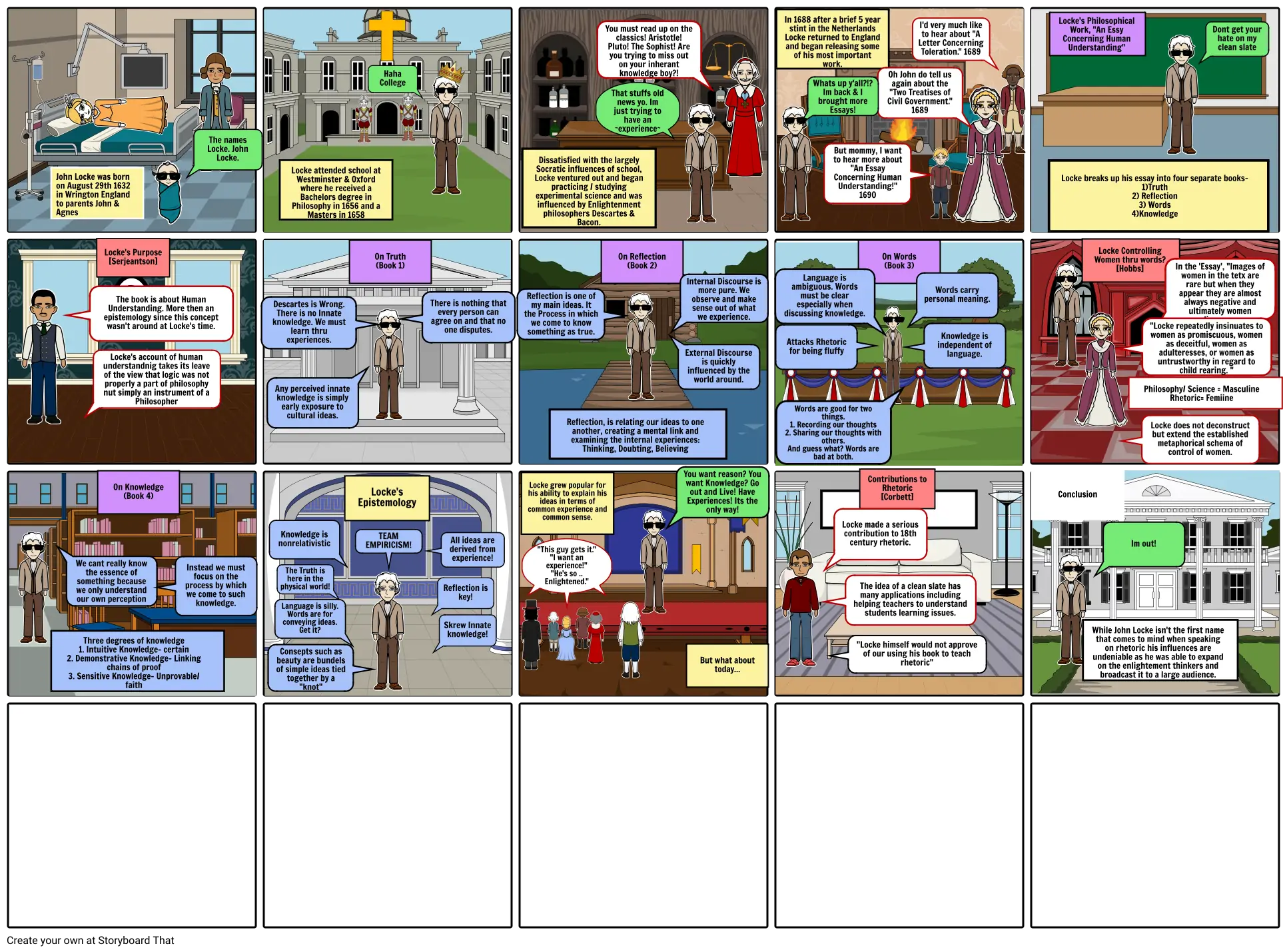ENC 3021 Locke Project

Текст Раскадровки
- John Locke was born on August 29th 1632 in Wrington England to parents John & Agnes
- The names Locke. John Locke.
- Locke attended school at Westminster & Oxford where he received a Bachelors degree in Philosophy in 1656 and a Masters in 1658
- Haha College
- Dissatisfied with the largely Socratic influences of school, Locke ventured out and began practicing / studying experimental science and was influenced by Enlightenment philosophers Descartes & Bacon.
- That stuffs old news yo. Im just trying to have an ~experience~
- You must read up on the classics! Aristotle! Pluto! The Sophist! Are you trying to miss out on your inherant knowledge boy?!
- In 1688 after a brief 5 year stint in the Netherlands Locke returned to England and began releasing some of his most important work.
- Whats up y'all?!? Im back & I brought more Essays!
- Oh John do tell us again about the "Two Treatises of Civil Government." 1689
- I'd very much like to hear about "A Letter Concerning Toleration." 1689
- But mommy, I want to hear more about "An Essay Concerning Human Understanding!" 1690
- Locke breaks up his essay into four separate books- 1)Truth 2) Reflection 3) Words 4)Knowledge
- Locke's Philosophical Work, "An Essy Concerning Human Understanding"
- Dont get your hate on my clean slate
- The book is about Human Understanding. More then an epistemology since this concept wasn't around at Locke's time.
- Locke's account of human understandnig takes its leave of the view that logic was not properly a part of philosophy nut simply an instrument of a Philosopher
- Locke's Purpose [Serjeantson]
- Any perceived innate knowledge is simply early exposure to cultural ideas.
- On Truth (Book 1)
- Descartes is Wrong. There is no Innate knowledge. We must learn thru experiences.
- There is nothing that every person can agree on and that no one disputes.
- Reflection, is relating our ideas to one another, creating a mental link and examining the internal experiences: Thinking, Doubting, Believing
- On Reflection (Book 2)
- Reflection is one of my main ideas. It the Process in which we come to know something as true.
- External Discourse is quickly influenced by the world around.
- Internal Discourse is more pure. We observe and make sense out of what we experience.
- Language is ambiguous. Words must be clear especially when discussing knowledge.
- Words are good for two things. 1. Recording our thoughts 2. Sharing our thoughts with others. And guess what? Words are bad at both.
- On Words (Book 3)
- Attacks Rhetoric for being fluffy
- Knowledge is independent of language.
- Words carry personal meaning.
- Locke Controlling Women thru words? [Hobbs]
- "Locke repeatedly insinuates to women as promiscuous, women as deceitful, women as adulteresses, or women as untrustworthy in regard to child rearing. "
- Locke does not deconstruct but extend the established metaphorical schema of control of women.
- Philosophy/ Science = Masculine Rhetoric= Femiine
- In the 'Essay', "Images of women in the tetx are rare but when they appear they are almost always negative and ultimately women disappear.
- Three degrees of knowledge 1. Intuitive Knowledge- certain 2. Demonstrative Knowledge- Linking chains of proof 3. Sensitive Knowledge- Unprovable/ faith
- We cant really know the essence of something because we only understand our own perception
- On Knowledge (Book 4)
- Instead we must focus on the process by which we come to such knowledge.
- Knowledge is nonrelativistic
- Language is silly. Words are for conveying ideas. Get it?
- The Truth is here in the physical world!
- Locke's Epistemology
- TEAM EMPIRICISM!
- Consepts such as beauty are bundels of simple ideas tied together by a "knot"
- All ideas are derived from experience!
- Reflection is key!
- Skrew Innate knowledge!
- Locke grew popular for his ability to explain his ideas in terms of common experience and common sense.
- "This guy gets it." "I want an experience!" "He's so .. Enlightened."
- You want reason? You want Knowledge? Go out and Live! Have Experiences! Its the only way!
- But what about today...
- The idea of a clean slate has many applications including helping teachers to understand students learning issues.
- Locke made a serious contribution to 18th century rhetoric.
- "Locke himself would not approve of our using his book to teach rhetoric"
- Contributions to Rhetoric [Corbett]
- Conclusion
- While John Locke isn't the first name that comes to mind when speaking on rhetoric his influences are undeniable as he was able to expand on the enlightement thinkers and broadcast it to a large audience.
- Im out!
Создано более 30 миллионов раскадровок
Никаких Загрузок, Кредитной Карты и Входа в Систему не Требуется!
